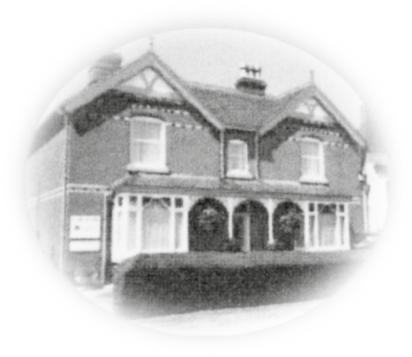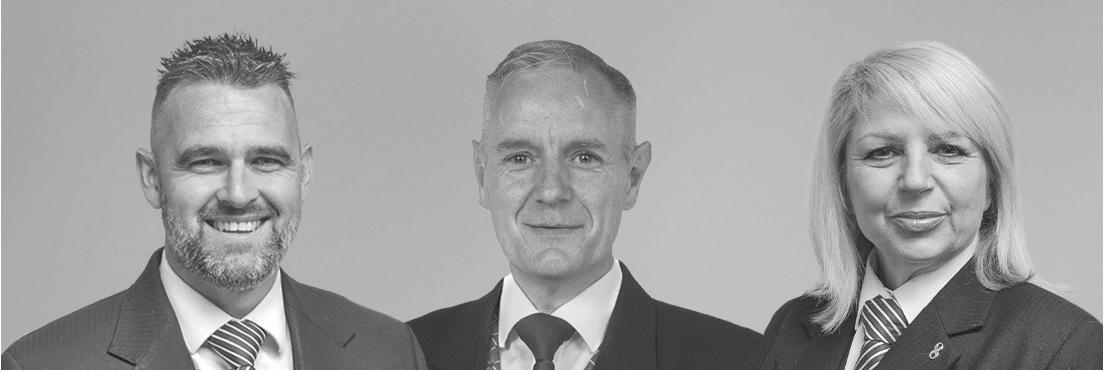Information for Relatives Following
Evesham Community Hospital Waterside Evesham WR11 1JT 01386 502449
a Bereavement
We offer you our condolences on your recent bereavement and hope this booklet will be helpful in arranging the funeral and in understanding some of the feelings you may be experiencing.
Introduction
The death of someone close is likely to be one of the most distressing experiences anyone has to face. The early days following the death can be bewildering and difficult and it can be a very confusing time with mixed feelings, thoughts and emotions. Grief reactions are varied and frightening, and remain a very individual experience.
Talking about a death may be difficult and make some people feel uncomfortable. They often don’t know what to say. Some people may find it easier to avoid the subject but most bereaved people find it helpful to talk, despite it being upsetting. It is not easy to know with whom to talkwith friends, family or professionals. Nor is it easy to know where to get help.
We hope this handbook provides some helpful, practical and emotional advice at this very difficult time, whilst offering information about how to contact Local and National Support Services. All of the information contained was correct at the time of printing in January 2024.
The Handbook is divided into three sections:
Part One - Offers some guidance and practical advice
Part Two - Explores some of the feelings you may be experiencing
Part Three - Provides some useful hints, contacts and support
Part One - Practical Advice
Following the death of someone there are a great deal of practical jobs that need to be done, and it may be useful to have the help of a family member or friend who is good at speaking to people and organising things.
The following pages give a brief guide, but the website www.gov.uk, goes into much more detail.
1
People die in lots of different situations and depending on the circumstances of the death, the next few weeks may vary widely. With an expected death the following process usually takes place:
Death Certificate
There are two certificates - the first issued by the doctor at time of death which is sent to the registrar by the hospital and the second is the one that the registrar then issues. Your local doctor will normally issue a medical certificate of cause of death within 24 to 48 hours and you need to know this is completed before you can register the death. In some cases, the doctor may be unsure of the cause of death, and the coroner will need to be informed. In this instance, the coroner usually issues the death certificate directly to the Registrar’s Office unless an inquest is requested.
You may contact any Funeral Director of your choice, and you do not have to wait until the death certificate is issued. In some cases it may not be possible for the hospital doctor to issue a death certificate showing the cause of death (e.g. if the death is referred to a Coroner). In these circumstances, notify your Funeral Director and follow their advice. Providing there is no Coroner’s involvement, you will be given a death certificate as soon as it has been completed by the appropriate doctor.
Post-Mortems
The doctor may request a hospital post-mortem to gain further knowledge of the cause of death. The next of kin has to agree freely to this and sign a consent form. No pressure will be put on you.
However, if the death is sudden, following an accident, operation, fracture etc. or cause unknown, the death may be reported to the Coroner who may order a post-mortem to be carried out. A certificate will not be issued by the hospital - the Coroner’s Office will contact the Next of Kin and advise them about registering the death.
Registering a Death
To register a death in Worcestershire you need to call the Worcestershire Registration Service on 01905 768181. An appointment with the Registrar will be made and guidance offered as required.
2
All deaths need to be registered – normally within five working days (unless the Coroner is involved) and before the funeral can take place.
Evesham Registration Office
The nearest Registrars Office to the Evesham Community Hospital is located as follows:
Evesham Registration Office
Oat Street
Evesham
Worcestershire WR11 4PJ
Evesham Register Office
Oat Street
Evesham
Worcestershire WR11 4PJ
Car parking is available next to the building where the office is located. A4184
A 4 1 8 4 H I G H S T R E E T
LN SWANLN CHAPEL ST
Library
SWAN
Evesham
OATST OATST OATST COWLST Evesham Copyright © 2024 RNS Publications 3
Who May Register a Death
Only certain people can register a death with the Registrar of Births, Deaths and Marriages:
• The next of kin or close relative.
• A person present at the time of death if there is no next of kin.
• The occupier, i.e. Matron or Officer in charge of a nursing or residential home, provided they knew of the illness before the death.
• The person arranging the burial or cremation of the body.
The registrar will need to know:
• Date and place of death.
• Full name, date and place of birth of the deceased.
• The deceased’s last address.
• The deceased’s date and place of birth.
• The deceased’s occupation and the name and occupation of the surviving widow or widower.
• Whether the deceased was getting a pension or allowance from public funds.
• If the deceased was married, the date of birth and occupation of the surviving widow or widower.
You will need:
• The deceased’s medical card if available.
The registrar will provide:
• The death certificate.
• Certified copies of the registered entry can be purchased. These are shown to insurance companies, banks, building societies etc. to prove that the death has occurred.
• A certificate for burial or cremation - known as the green form - this is needed by the funeral director (unless it is a cremation and the coroner is involved or it is an inquest).
• A certificate for Department of Works and Pensions (DWP) so that any benefits can be adjusted - Form BD8.
4
Burial
Most churches and cemeteries have set fees for burials of which your Funeral Director can advise you. The costs may be higher for the burial of someone who lived outside the parish. Many church yards are no longer open for burials because there is no space left. If a space has been paid for in a cemetery, there will be a Deed of Grant. Most non-denominational cemeteries are owned by either local authorities or private companies, so fees may vary.
Cremation
No one can be cremated until the cause of death is definitely known. There are certain forms that you will be required to sign. Ashes can be scattered in a garden of remembrance or in a favourite spotpermission for this may have to be granted. They may be buried in a church yard or cemetery or they can be kept.
If you have any further questions, please do ask your Funeral Director. A helpful booklet “Questions People Ask About Cremation” can be obtained from your Funeral Director.
Unexpected/Sudden Death
If the death was sudden or unexpected then you may already have had contact with the local police. Although this can sometimes be distressing it is required by Law. The police then have to consult with the Coroner to see if any further information is needed regarding the death, which may involve a post mortem and an inquest.
The Coroners Officer will remain in contact and keep you up to date with progress. You can still contact a Funeral Director who will be able to let you know when formalities have been completed and the funeral can take place.
Organising the Funeral
You may know exactly what the deceased person’s wishes were regarding a funeral. If not, it is worth checking if they made a will. This may be held at a local solicitors’ office, and they may have some responsibility for dealing with the estate.
5
The type and cost of a funeral can vary and it is worth establishing the cost in advance. If you have not decided on a funeral directors most of them will be listed in the Yellow Pages Phone Directory, and it is best to choose one who is a member of either the National Association of Funeral Directors or the National Society of Allied and Independent Funeral Directors.
Finances
Many people have money worries after bereavement so it is a good idea to check whether you are entitled to any state benefits. Your local Citizens Advice Bureau or Worcestershire Hub Centre will be able to assist you. The registrar will also have a Bereavement Benefit Form SF200 available.
Stopping Junk Mail
To avoid unwanted post Stop Mail is a service which has been specifically set up to remove from data bases and mailing files the names and addresses of people who have died (contact details at back of this handbook).
Tell Us Once
Tell Us Once is a service that lets you report a death to most government organisations in one go.
When you register the death the registrar will:
• let you know if the service is available in your area
• give you the phone number
• give you a unique reference number to use the Tell Us Once service online (death-tellusonce.direct.gov.uk/Death/Enrich/Recover) or by phone
Before you use Tell Us Once
You’ll need the following details for the person who died:
• date of birth
• National Insurance Number
• driving licence number
6
• vehicle registration number
• passport number
You’ll also need:
• details of any benefits or entitlements they were getting, for example State Pension
Charitable Donations
If you would like a donation to be made to a favourite charity rather than flowers at the funeral, please discuss this with your Funeral Director.
Cultural Differences
People from different cultures deal with death in their own distinctive ways. The rituals and ceremonies of mourning may be very public and demonstrative, or private and quiet. In some cultures the period of mourning is fixed, in others not. The feelings experienced by bereaved people in different cultures may be similar, but their ways of expressing them are very different. The information provided is dependent on personal beliefs and culture is not ‘absolute’.
7
People to Inform
There are various people who need to be informed of the death and it may be useful to use these checklists to guide you. Tick boxes have been provided to help with this.
Cards
Gas Supplier
Water Supplier
Electricity Supplier
The Family Doctor
Social Services - if involved
School/College - if appropriate
Council Tax
Bank
Life Insurance Company
Car Insurance
Royal Mail Deliveries
Store Cards
Mobile Phone Company
Relevant Hospital Doctors
Employer
Union/Professional Organisations
Department of Work and Pensions
Who to contact Completed Not completed Mortgage Company Housing
Assoc/Landlord Building Society
Credit
Property/Contents Insurance DVLA
8
Things to Cancel
Care/household services e.g. home help, cleaner, meals on wheels
Medical appointments, tests, hospital scans etc.
Junk Mail - see details at rear of book
Items such as order books and giro cheques will have to be returned to the appropriate Department for Work and Pensions. Make a note of any pension book or order book numbers before you send them back.
Mobility aids e.g. commode, walking stick, chair raisers, specialist cushions/mattress Passport Disabled Parking - Blue Badge
to contact Meals on Wheels
e.g.
Newspapers
Contacted
Service
General Appointments
dentist, optician
Redirect Mail if required Milk if delivered
Item to return Returned Medicines back to pharmacy Driving Licence Library Books
9
Part Two - Emotions and Feelings
This section of the handbook offers you the opportunity to explore and perhaps begin to understand the roller-coaster ride of changing emotions you may well be experiencing at this time.
Whoever has died, each loss is unique and everyone will cope with it in his or her own way. Although bereavement is a personal and often traumatic event, many people go through a recognisable process of emotions and reactions, when someone close to them dies.
Realising that the following emotions associated with grief are quite normal may help.
• Numbness
• Yearning
• Anger
• Guilt
Grieving
Grieving is a natural process that can take place after any kind of loss. When a loved one dies our natural feelings have to run their course.
There are many different feelings you may experience which cannot be hurried. Everyone is individual but we all have similar feelings when grieving such as sorrow or numbness.
Grief is a natural, unavoidable reaction, which allows us to begin to come to terms with our loss, and to adjust to the change it has made to our lives. For every individual the loss of a loved one and the changes experienced are different, as each person’s grief is unique.
A similar experience of grieving and loss can also be felt by those who have suffered stillbirths, miscarriages, or lost very young babies. They will also need the same support, care and consideration.
10
Numbness
In the few hours or days following the death of a close relative or friend, most people feel simply stunned, as though they cannot believe it has actually happened. They may feel like this even if the death has been expected. This sense of emotional numbness can be helpful in getting through all the important practical arrangements that have to be made, such as getting in touch with relatives and organising the funeral. For many people, the funeral or memorial service is an occasion when the reality of what has happened really starts to sink in.
Yearning
Soon though, this numbness disappears and may be replaced by a dreadful sense of agitation, of pining or yearning for the dead person. There is a feeling of wanting somehow to find them, even though this is clearly impossible. This makes it difficult to relax or concentrate and it may be difficult to sleep properly.
Anger
People often feel very angry at this time. This is a common reaction but if this feeling persists help should be sought.
Guilt
Another common feeling is guilt. People find themselves going over in their minds all the things they would have liked to have said. They may also feel that they could have done some things differently, or changed what had happened in some way.
A sense of relief is often felt when someone has died after a particularly painful or distressing illness. This feeling of relief is natural, understandable and very common.
11
Coping with Emotions in the Weeks/Months Following Bereavement
In the weeks following the funeral there can still be sudden changes of emotion which can be confusing to oneself, friends and relatives, but are just part of the normal way of passing through the different stages of mourning.
These strong, confusing emotions can be felt for quite a while after death and can be followed by periods of sadness and extreme tiredness. Feelings of grief can occur at any time, sparked off by people, places or things that bring back memories.
During this time it may appear to others as though the bereaved person is spending a lot of time just sitting, doing nothing. In fact, they are usually thinking about the person they have lost, going over both the good times and the bad times they had together. This is a quiet but essential part of coming to terms with the death.
As time passes, the initial fierce pain of early bereavement normally begins to fade. Feelings of sadness and depression tend to lessen and it is again possible to think about other things and even to look to the future. Time helps us to adjust and for the majority of people it often helps to gradually resume some normal daily activities.
Children and Adolescents
Even though children may not completely understand the meaning of death, they also feel the loss of close relatives or friends. However, depending on their age their level of understanding and how they cope may be very different. Young people may not speak of their grief for fear of adding an extra burden to the grown-ups around them. The grief of children and adolescents, and their need for mourning, should not be overlooked when a member of the family has died. Wherever possible it may help them by attending the funeral and expressing their own grief for example, by talking, writing, or buying flowers.
12
How Friends and Relatives Can Help
Family and friends can help by spending time with the person who has been bereaved. It is not so much words of comfort that are needed, but more the willingness to be with them during the time of their pain and distress. A sympathetic arm around the shoulders will express care and support when words are not enough. It is important that, if they wish it, bereaved people are able to cry with somebody and talk about their feelings.
Others may find it hard to understand why the bereaved have to keep going over the same ground again and again, but this is part of the process of resolving grief and should be encouraged.
People often avoid mentioning the name of the person who has died for fear that it will be upsetting. However, to the bereaved person it may seem as though others have forgotten their loss, adding a sense of isolation to their painful feelings of grief.
Practical help with cleaning, shopping or looking after children can ease the burden of being alone. Elderly bereaved partners may need help with the chores that the deceased partner used to handle - coping with bills, cooking, housework and so on.
It is important to allow people enough time to grieve. Some can seem to get over the loss quickly, but others take longer. So don’t expect too much too soon from a bereaved relative or friend - they need the time to grieve properly, and this will help to avoid problems in the future.
Getting Help to Resolve Feelings of Grief
Some people hardly seem to grieve at all. They avoid any mention of their loss, do not cry at the funeral and appear to return to their normal life remarkably quickly. For some people this is just their normal way of dealing with their loss and no harm occurs.
Others however may suffer physical illness and periods of deep sadness for some time. Some people get stuck in the grieving pattern, the sense of disbelief and shock continues and never seems to end, they cannot think about anything else but the death of their loved one.
Bereavement can turn the world upside-down and is one of the most painful experiences we endure. It can be strange, terrible and
13
overwhelming. In spite of this, it is a part of life that we all go through and usually does not require any specialist help.
For those who need support to resolve their grief or find themselves turning to smoking or alcohol to lesson the pain of grief, help should be sought, either from the local GP surgery or from other community and voluntary organisations. Some of these are listed at the back of this handbook.
Part Three - Support and Advice
Things to Do
• Express your feelings as much as possible. Try to bring into the open whatever you are feeling. This is important in working through your grief. Give yourself time to overcome your grief. Talk through what has happened with someone you trust, or a local support group.
• Take good care of yourself, and if possible get lots of rest, eat well and give yourself lots of time to grieve. Contact your doctor if you feel unwell, and speak of your loss.
• Keep in touch with friends and family. Many people may feel awkward about offering their help so it may be left to you to ask for it, even though this may be difficult for you.
• Begin to make longer-term plans for the future so that you will always have something to look forward to, but avoid rushing into making any big changes in your life.
Things to Avoid
• Don’t rush into having the funeral right away unless it is the practice of your culture
• Avoid entering into any financial or legal arrangements unless you fully understand them
• Avoid making any major changes to your life while you are still grieving
• Give yourself lots of time to think about changes you may wish to make and discuss plans with others
• Avoid letting others rush you into anything before you are ready, but remember that sometimes you may not know whether you are ready for something unless you give it a try.
14
Hospital Chaplain
The hospital chaplain is available to offer help and support following bereavement. Support is primarily of a pastoral nature and if required can include spiritual or religious support.
Pastoral Support is offered to all, it extends to all faiths and includes those of no faith. You do not have to be religious to ask for support.
On offer is:
• A listening ear
• Confidentiality
• Acceptance
• Support
Contact the chaplaincy team
The chaplain is supported by a team of volunteer chaplains and as with all staff, can be identified by hospital badges and follow strict confidentiality rules.
If you wish to make contact with the Chaplain, the contact details are below:
Email: Andy.green2@nhs.net
Office: 01386 502482 (int. 32482)
Mobile: 07590 485715
Reference: Evesham Community Hospital Bereavement Book
Review Date: February 2026
Publication Date: February 2024
15
Useful Contacts
Bereavement Support
Worcestershire
St Richards Hospice Foundation
Wildwood Drive
Worcester
WR5 2QT
Tel: 01905 760934
www.bereavementsupport worcestershire.org.uk
Citizens Advice Bureau
Look up local office in the telephone book or go to their www.citizensadvice.org.uk
CRUSE Bereavement Care
Local (Worcestershire) Helpline: 01905 22223
National Helpline: 0808 808 1677
Family Support Team
Primrose Day Hospice
St Godwalds Road
Bromsgrove
Worcestershire
B60 3BW
Tel: 01527 871 051
www.primrosehospice.org
KEMP Hospice
Contact our Bereavement Helpline on 01562 756060 for information and advice on what to do next when a death, under any circumstances has occurred. Helpline is open Monday - Friday 9am to 5pm.
Primrose at the Princess
Princess of Wales Community Hospital
Stourbridge Road
Bromsgrove
B61 0BB
Tel: 01527 488 213
Samaritans
24 hour Helpline: 116 123
www.samaritans.org
Stop Mail
Tel: 0808 168 9607
www.stopmail.co.uk
Worcestershire Hub
For advice on where and how to register a death
Tel: 01905 765765
16

The Hospital would like to thank RNS Publications for publishing this information and the following pages contain some features from services o ering their help at this time.
Whilst the Hospital is grateful of their support it does not endorse or recommend any of the services that they provide.

It is distressing to deal with a bereavement and unsolicited mail can be insensitive and destructive during a grieving process.
By scanning the below QR code on your phone or visiting www.stopmail.co.uk, we are able to securely share this information with mailing organisations and under the Data Protection Act the information will not be used for any other purpose.
Other benefits reduce the possibility of identity fraud, such as assumed identity and you will only have to supply the information once.

�\\ bereavement ,�port network stopping mail STOPPING JUNK MAIL
www.stopmail.co.uk 0808 168 9607 from a landline 0333 006 8114 from a mobile © Bereavement Support Network Ltd 2024







This publication has been jointly developed between ourselves and the hospital. We hope that it has been or will be of help at this time and we welcome any comments or suggestions that you may have.
Please contact us either by phone, email or by post. RNS Publications, Trium House, Broughton Way, Whitehills, Blackpool, Lancashire FY4 5QN 01253
832400
A trading style of Turnside Marketing Ltd
enquiries@rns.co.uk




Published by RNS Publications © Tel: 01253 832400 R3














